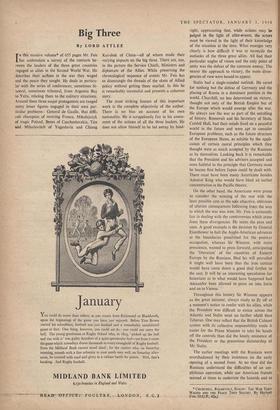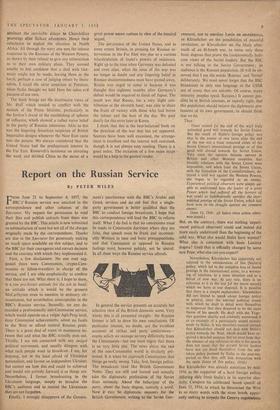Big Three
By LORD ATTLEE
lN this massive volume' of 655 pages Mr. Feis has undertaken a survey of the contacts be- tween the leaders of the three great countries engaged as allies in the Second World War. He describes their actions in the war they waged and the peace they sought. He deals in particu- lar with the series of conferences, sometimes bi- lateral, sometimes trilateral, from Argentia Bay to Yalta, relating them to the military situations. Around these three major protagonists are ranged many lesser figures engaged in their own par- ticular problems : General de Gaulle, that diffi. cult champion of reviving France, Mikolajczyk of tragic Poland, Benes of Czechoslovakia, Tito and Mihailovitch of Yugoslavia and Chiang Kai-shek of China—all of whom made their varying impacts on the big three. There are, too, in the picture the Service Chiefs, Ministers and diplomats of the Allies. While preserving the chronological sequence of events Mr. Feis has to disentangle the threads of the skein of Allied policy without getting •them snarled. In this he is remarkably successful and presents a coherent story.
The most striking feature of this important work is the complete objectivity of the author. There is no bias on account of his own nationality. He is scrupulously fair in his assess- ment of the actions of all the three leaders. He does not allow himself to be led astray by hind- sight, appreciating that, while actions may be judged in the light of after-events, the actors must be viewed in the light of their knowledge of the situation at the time. What emerges very clearly is how difficult it was to reconcile the outlooks of the three great allies. All had their particular angles of vision and the only point of unity was the defeat of the common enemy. The nearer the approach to victory, the more diver- gencies of view were bound to appear.
Stalin had a single-minded outlook. He cared for nothing but the defeat of Germany and the placing of. Russia in a dominant position in the world. Churchill, no less determined on victory, thought not only of the British Empire but of the Europe which would emerge after the war. He always saw' the war as part of the unrolling of history. Roosevelt and his Secretary of State, Cordell Hull, had their minds fixed on a peaceful world in the future and were apt to consider European problems, such as the future structure of the European States, as soluble by the appli- cation of certain moral principles which they thought were as much accepted by the Russians as by themselves. Looking back it is remarkable that the President and his advisers accepted and were faithful to the principle that Germany must be beaten first before Japan could be dealt with. There must have been many Americans besides Admiral King who would have liked an earlier concentration in the Pacific theatre.
On the other hand, the Americans were prone to consider the winning of the war with the least possible cost as the sole objective, oblivious of ulterior consequences following from the way in which the war was won. Mr. Feis is extremely fair in dealing with the controversies which arose from these divergencies. He states the pros and cons. A good example is the decision by General Eisenhower to halt the Anglo-American advances at the boundaries presdribed for the postwar occupation, whereas Sir Winston, with more prescience, wanted to press forward, anticipating the 'liberation' of the countries of Eastern Europe by the Russians. Had his will prevailed it might well have been that the iron curtain would have come down a good deal farther to the east. It will be an interesting speculation for historians as to what would have happened had Alexander been allowed to press on into Istria and on to Vienna.
Throughout this history Sir Winston appears as the great initiator, always ready to fly off at a moment's notice to confer with his allies, while the President was difficult to entice across the Atlantic and Stalin went no farther afield than Teheran. One may reflect that the British Cabinet system with its collective responsibility made it easier for the Prime Minister to take his hands off the controls than did the lonely eminence of the President or the precarious dictatorship of Mr. Stalin.
The earlier meetings with the Russians were overshadowed by their insistence on the early opening of a second front. At no time did the Russians understand the difficulties of an am- phibious operation, while our American friends seemed at times to underrate the hazards and to * CHURCHILL, ROOSEVELT, STALIN : THE WAR THEY WAGED AND THE PEACE THEY SOUGHT. By Herbert
Feis, (0.U.P., 42s.) attribute .the inevitable delays to Churchillian yearnings after Balkan adventures. Hence their reluctance to exploit the situation in North Africa. All through the story one sees the intense suspicion by the Russians of the Western Powers, as shown by their refusal to give any information as to their own military plans. They seemed unable to feel confident that a deal with Ger- many might not be made, leaving them in the lurch, perhaps a case of judging others by them- selves. 1 recall the same suspicion at Potsdam, when Stalin thought we held Hess for some evil purpose of our own. .
The book brings out the doctrinaire views of Mr. Hull which tended to conflict with the realism of the Prime Minister, particularly in the former's dread of the establishing of spheres of influence, which showed a rather naive belief in the purity of Russian intentions. Akin to this was the lingering American suspicion of British imperialist designs whenever the Near East came into the picture. We always considered that the United States had the predominant interest in the Far East. Roosevelt's insistence on elevating the weak and divided China to the status of a great power seems curious in view of the ironical sequel.
The persistence of the United States, and to some extent Britain, in pressing for Russian in- tervention in the Far East was due to a.curious miscalculation of Japan's powers of resistance. Right up to the time when Germany was defeated and even after, when the issue of the war was no longer in doubt and any lingering belief in Russian disinterestedness must have passed away, Russia was urged to come in because, it was thought that eighteen months after Germany's defeat would be required to finish off Japan. The result was that Russia, for a very slight con- tribution at the eleventh hour, was able to share the, fruits of victory with those who had borne the labour and the heat of the day. We paid dearly for this error later in Korea.
I think that this is the best-balanced book on the direction of the war that has yet appeared. Sources have been well examined, the arrange- ment is excellent and the interest well sustained, though it is not always easy reading. There is a good index. The inclusion of a few more maps would be a help to the general reader.











































 Previous page
Previous page